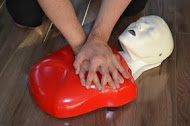
Individuals who are terminally ill and would want to make a choice on their life need to make concrete decisions. It is for this reason that one needs to define and decide what is important. Usually, when a loved one states that they do not want CPR done, many individuals are taken aback because the common and logical approach is, who does not want CPR? Add to this the fact that in the absence of CPR, there is usually the feeling of denying the patient the opportunity to live. The importance of making a CPR decision rests solely with the patient, and for this reason, there are a number of factors that come into play.
CPR, cardiac pulmonary resuscitation is a rescue method that is used when the patient’s heart has stopped beating and/or breathing has stopped. There are two types of CPR techniques presently available for patients: conventional CPR as well as hands-only CPR. The difference between the two is that in the first, the technique combines rescue breaths and chest compressions. The second, just as the name suggests, incorporates chest compressions only in the absence of rescue breaths. Knowing that this plays a key role when the heart has stopped beating, what are some of the reasons why a patient would opt against a CPR decision? To answer this, let us look at some of the factors that influence the process of decision making as pertains to CPR.
– What the patient’s understanding of CPR as a medical procedure is
– What CPR techniques actually entail
– The emotional well being of the patient making the decision.
These three factors have a concrete bearing on the CPR decision making process. To get a fresh perspective on this, let us look at the decision making process from the patient’s angle. Due to what different avenues of media portray, the patient is not faulted for thinking that CPR works all the time, well, at least most of the time. Medical shows have not been left behind either, and it is for this reason that sometimes a patient can have excessive expectations of the role of this technique, therefore influencing the CPR decision making process.
What are the facts of CPR that a patient should know prior to making their decision?
– The success rate of CPR is dependent on a number of factors including:
- How soon was CPR started when the patient’s heart stopped beating and/or breathing stalled? The quicker the onset of CPR the higher the chances of survival.
- Since the brain tissue starts to die within 4 minutes of lack of oxygen, medical professionals attending to such a patient need to arrive on time. Naturally, this may not always be possible, and this is what makes it important for individuals to learn CPR, whether or not they choose to make the CPR decision.
- The third factor that influences the decision making process is the age of the patient. Older patients as well as those who are disabled may not stand to benefit from CPR, and in many cases, this is what influences their decision.
There you have it. The next time someone tells you that they do not want CPR done, you will have a better understanding why this would happen.
